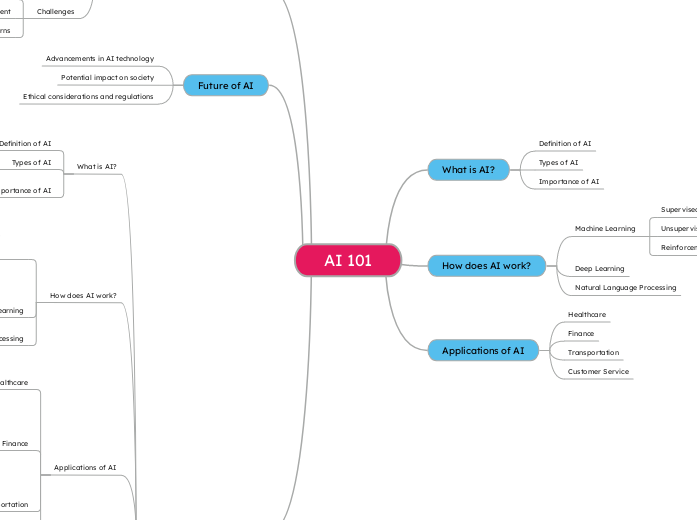AI 101
What is AI?
Definition of AI
Types of AI
Importance of AI
How does AI work?
Machine Learning
Supervised Learning
Unsupervised Learning
Reinforcement Learning
Deep Learning
Natural Language Processing
Applications of AI
Healthcare
Finance
Transportation
Customer Service
Benefits and Challenges of AI
Benefits
Automation of tasks
Improved efficiency and accuracy
Personalization of experiences
Challenges
Ethical considerations
Job displacement
Data privacy and security concerns
Future of AI
Advancements in AI technology
Potential impact on society
Ethical considerations and regulations
Detailed breakdown
What is AI?
Definition of AI
AI is the simulation of human intelligence in machines that are programmed to think and learn like humans
Types of AI
Narrow AI and General AI
Importance of AI
AI has the potential to revolutionize various industries and improve daily life
How does AI work?
Machine Learning: A subset of AI that allows machines to learn from data and improve performance
Supervised Learning
Training the machine with labeled data to make predictions or decisions
Unsupervised Learning
Machine learns patterns and relationships in data without any prior labels
Reinforcement Learning
Machine learns through trial and error using rewards and punishments
Deep Learning
Neural networks that mimic the human brain and enable machines to process complex data
Natural Language Processing
AI's ability to understand and process human language
Applications of AI
Healthcare
AI can assist in diagnosis
drug discovery
and personalized treatment plans
Finance
AI can analyze financial data
detect fraud
and provide personalized financial advice
Transportation
AI can enhance autonomous vehicles
traffic management
and logistics
Customer Service
AI-powered chatbots and virtual assistants can provide efficient customer support
Benefits and Challenges of AI
Benefits
Automation of tasks
AI can perform repetitive tasks
saving time and effort
Improved efficiency and accuracy
AI systems can process vast amounts of data quickly and accurately
Personalization of experiences
AI can provide personalized recommendations and experiences to users
Challenges
Ethical considerations
AI raises ethical questions regarding privacy
bias
and decision making
Job displacement
AI automation may lead to job loss and require workforce adaptation
Data privacy and security concerns
AI relies on data
raising concerns about privacy and security breaches
Future of AI
Advancements in AI technology
AI is expected to become more sophisticated and capable of complex tasks
Potential impact on society
AI has the potential to transform industries
create new opportunities
and change daily life
Ethical considerations and regulations
As AI advances
there is a need for ethical guidelines and regulations to ensure responsible use
